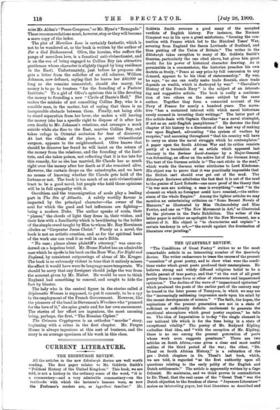CURRENT LITERAT URE.
THE EDINBURGH REVIEW.
All the articles in the new Edinburgh Review axe well worth reading. The first paper relates to Mr. Goldwin Smith's "Political History of the United Kingdom." This book, we are told, is not a history in the ordinary sense of the word, "it is a commentary—and a very admirable commentary—on the textbooks with which the lecturer's hearers were, as now the Professor's readers are, ex hypothesi familiar." Mr. Goldwin Smith reverses a good many of the accepted verdicts of English history. For instance, the Norman Conquest was in his eyes a great misfortune, "forming the con- nection with France which led to the Hundred Years' War, severing from England the Saxon Lowlands of Scotland, and thus putting off the Union of Britain." The writer in the Edinburgh takes exception to many of Mr. Goldwin Smith's theories, particularly the one cited above, but gives him great credit for his power of historical character drawing. As is permissible in a commentator, the historian preaches his own doctrin es freely, "Peace at any price by full concession to any demand, appears to be his ideal of statesmanship." By war, he says, "no one can really make trade flourish, since trade depends on wealth, which is destroyed by war." "Chevalier's History of the French Navy" is the subject of an interest- ing and suggestive article. The book is really a continua- tion of two others on the same subject by the same author. Together they form a connected account of the Navy of France for nearly a hundred years. The narra- tive "has a sustained interest with which naval historians rarely succeed in investing their writings." The latter part of the article deals with Captain Chevalier "as a naval strategist, if not as an anti-English pamphleteer." He devotes the final chapter of his history to a discussion of the best way of making war upon England, advocating "the system of warfare by surprise," and assuming throughout "that his country will have to carry on alone the naval struggle which he contemplates." A paper upon the South African War and its critics consists partly of a translation of an article which appeared last January in the Berliner Local-Anudger by a Major-General von Schmeling, an officer on the active list of the German Army. The text of the German article is "The cart sticks in the mud," which words the German writer attributes to Lord Kitchener. His object was to prove that it was practically impossible that the British cart should ever get out of the mud. The Edinburgh Reviewer attributes the fact that it is out of the mud to the genius of Lord Roberts—one more proof of the theory that "in war men are nothing, a man is everything "—and "to the element on which no foreigner could have counted,—the enthu- siasm of the whole Empire." Among the lighter articles we may mention an entertaining criticism on "Some Recent Novels of Manners," as illustrated by Miss Cholmondeley and Miss Fowler, and one on "The New Movement in Art," as illustrated by the pictures in the Paris Exhibition. The writer of the latter paper is neither an apologist for the New Movement, nor a satirist of it. His object is "to characterise and explain" a certain tendency in art,—" the revolt against the domination of literature over painting."


































 Previous page
Previous page